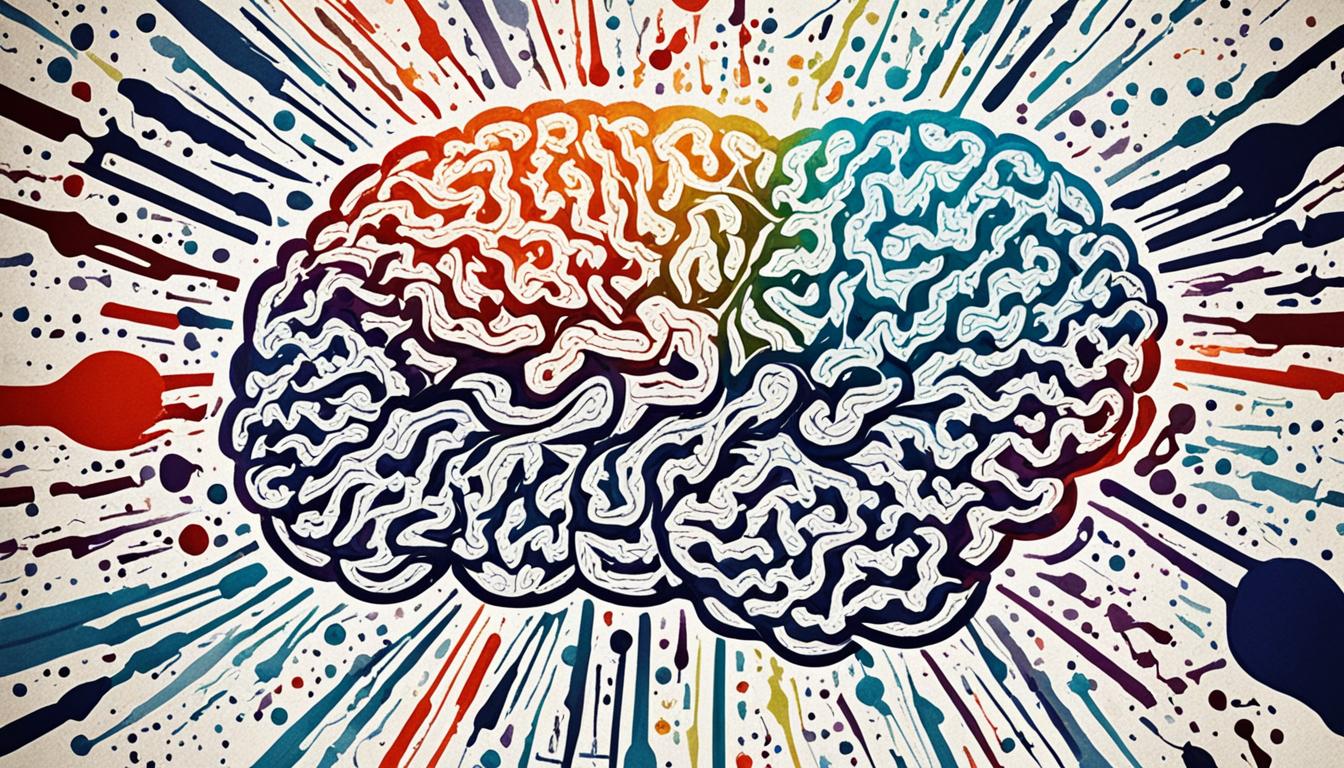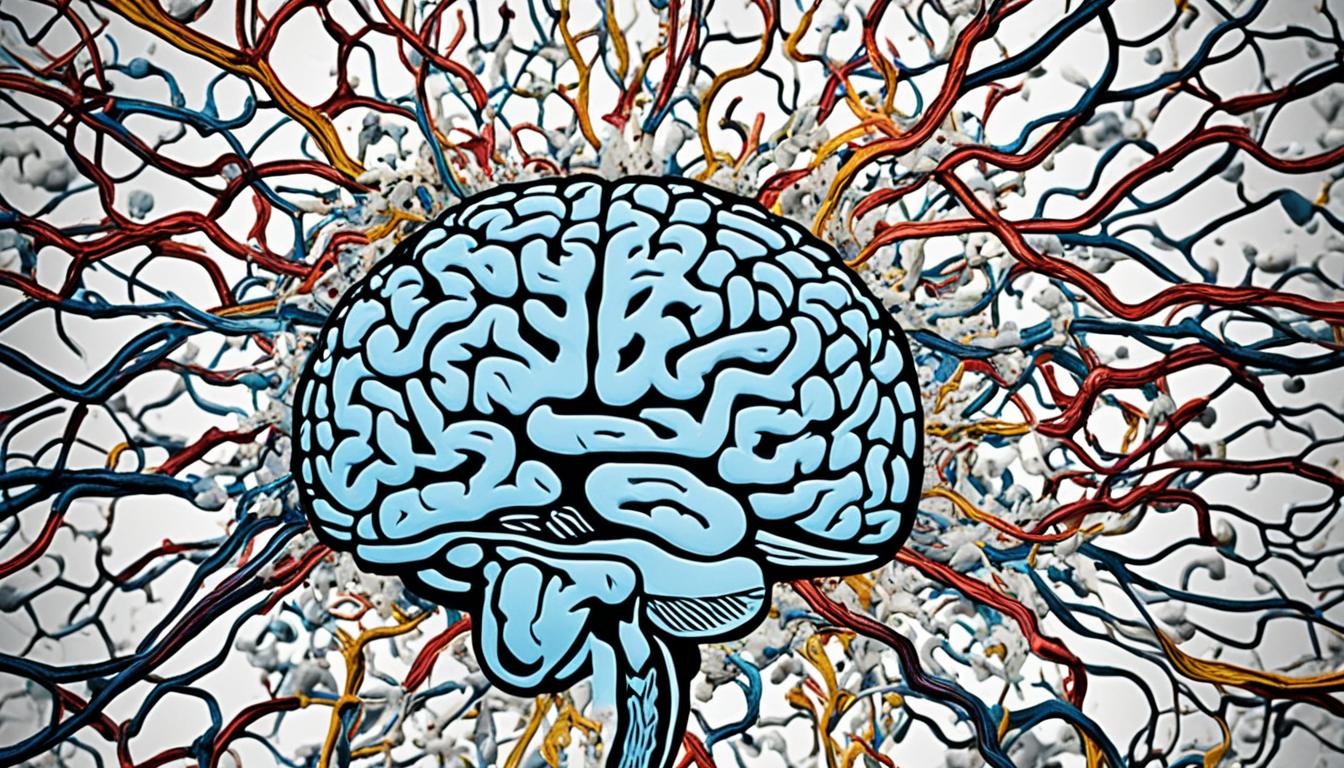In the first section, we will explore the symptoms of this brain disorder that is caused by repeated head injuries. CTE leads to the degeneration and death of nerve cells in the brain, impacting an individual’s cognitive, behavioral, and motor functions.
While the exact cause and development of CTE are not fully understood, it is commonly associated with contact sports, military combat, and exposure to explosive blasts. It is important to raise awareness about this condition, as the consequences of repeated head injuries can have long-term effects on an individual’s quality of life.
Unfortunately, CTE cannot be definitively diagnosed during life. At present, the only way to confirm a diagnosis is through an autopsy of the brain. However, recognizing the symptoms associated with CTE is crucial in order to seek appropriate medical attention and support.
In the following sections, we will delve deeper into the specific symptoms of CTE, diagnosis methods, causes and risk factors, as well as strategies for living with this condition. Stay with us to learn more about how CTE affects the brain and the importance of early detection and seeking medical help.
Table of Contents
ToggleSymptoms of Chronic Traumatic Encephalopathy
Chronic traumatic encephalopathy (CTE) can manifest differently in each individual, and there are no specific early signs directly associated with the condition. However, several common symptoms have been observed in people with CTE, including:
Cognitive Impairment
CTE can lead to cognitive difficulties, such as trouble thinking, memory loss, and challenges with planning and organization.
Behavioral Changes
Individuals with CTE may experience behavioral changes, including impulsive behavior and aggression, which may differ from their previous personality traits.
Mood Disorders
Mood disorders, such as depression, apathy, emotional instability, and substance misuse, have been associated with CTE.
Motor Symptoms
Motor symptoms may also occur in individuals with CTE. These can include problems with walking and balance, parkinsonism, and motor neuron disease.
It’s important to note that CTE symptoms typically develop gradually over years or even decades after a head injury, rather than immediately following the trauma.

Note: The image above represents the complexity of chronic traumatic encephalopathy and its effects on the brain.
Diagnosing Chronic Traumatic Encephalopathy
Currently, chronic traumatic encephalopathy (CTE) cannot be definitively diagnosed during a person’s lifetime, except in individuals with high-risk exposures. Diagnosis of CTE relies on the identification of the characteristic symptoms associated with the condition, known as traumatic encephalopathy syndrome.
Identifying High-Risk Exposures
High-risk exposures that increase the likelihood of developing CTE include frequent participation in contact sports, military combat, and exposure to explosive blasts. Individuals who have experienced repeated head injuries in these high-risk situations should seek medical attention if they exhibit symptoms related to CTE. Prompt diagnosis and intervention are crucial for managing the condition and improving quality of life.
Ongoing Research and Diagnostic Biomarkers
While definitive diagnostic methods currently do not exist, ongoing research aims to identify and develop diagnostic biomarkers for CTE. These biomarkers would provide healthcare providers with objective measures to confirm the presence of CTE in living individuals. However, at present, no validated diagnostic biomarkers are available.
One promising avenue of research involves the detection of specific proteins in the blood or cerebrospinal fluid that may indicate the presence of CTE. However, further studies are necessary to ensure the accuracy and reliability of these potential biomarkers.
Diagnostic Process
Given the current limitations in definitive diagnosis, healthcare providers evaluate and diagnose CTE based on the individual’s medical history, symptom presentation, and the exclusion of other possible causes. It is essential for individuals with a history of repeated head injuries or high-risk exposures to inform their healthcare providers and undergo a comprehensive evaluation to determine the likelihood of CTE.
The diagnostic process typically involves a thorough physical examination, cognitive assessments, and imaging studies. Such evaluations help rule out other conditions with similar symptoms and provide a comprehensive understanding of the individual’s overall cognitive and neurological health.
Importance of Timely Diagnosis
Although a definitive diagnosis of CTE is currently not possible during an individual’s lifetime, seeking medical attention when symptoms arise can help facilitate early intervention and appropriate management. Timely diagnosis enables healthcare providers to implement strategies to address symptoms, provide support, and improve the individual’s quality of life.
| Signs and Symptoms | Considerations |
|---|---|
| Cognitive Impairment | Includes trouble thinking, memory loss, and difficulties with planning and organization |
| Behavioral Changes | May involve impulsive behavior, aggression, or other significant shifts in behavior |
| Mood Disorders | Could present as depression, apathy, emotional instability, or substance misuse |
| Motor Symptoms | May include problems with walking, balance, parkinsonism, or motor neuron disease |
Causes and Risk Factors of Chronic Traumatic Encephalopathy
Chronic traumatic encephalopathy (CTE) is primarily caused by repeated head trauma, such as concussions or blows to the head. Athletes participating in contact sports like football or boxing, as well as individuals involved in military combat, are particularly vulnerable to this condition. However, it is important to note that not everyone who experiences repeated head trauma will develop CTE, suggesting the involvement of additional risk factors.
In the brains of individuals with CTE, researchers have discovered an accumulation of tau protein around the blood vessels. This deposition of tau protein differs from the tau accumulations found in Alzheimer’s disease. The precise mechanisms by which repeated head trauma and tau protein contribute to the development of CTE are still being studied and are not yet fully understood.
Risk Factors for Chronic Traumatic Encephalopathy
| Risk Factors | Description |
|---|---|
| Repeated Head Trauma | Multiple concussions or blows to the head |
| Contact Sports | Participating in sports with frequent head impacts, like boxing or football |
| Military Combat | Exposure to repetitive head injuries during military service |
| Tau Protein Accumulation | Buildup of tau protein around blood vessels in the brain |
| Genetic Predisposition | Individuals with certain genetic factors may be more susceptible to CTE |

While repeated head trauma is the primary cause of CTE, it is important to note that other risk factors, such as genetic predisposition, may play a role. Further research is needed to fully understand the complexities of CTE development and identify additional risk factors, allowing for more effective prevention and management strategies.
Living with Chronic Traumatic Encephalopathy
In the earlier stages of living with chronic traumatic encephalopathy (CTE), you may be able to care for yourself with the guidance of healthcare providers. They can provide you with advice on managing your symptoms and making lifestyle modifications to adapt to the condition. However, as CTE progresses, self-care may become more challenging, and you may require assistance or may no longer be able to live independently.
It is important for individuals with an early diagnosis of CTE to discuss their wishes and preferences with their healthcare providers and loved ones. This ensures that your decisions regarding your care and treatment are followed, especially in the advanced stages of the condition. Decision-making can become more difficult as CTE affects your cognitive abilities, so it’s important to have these conversations in advance and establish a plan for your future care.
As CTE progresses, you may experience changes in your self-care routine. Tasks that were once second nature may become more challenging or impossible to complete independently. This can include activities such as personal hygiene, meal preparation, medication management, and household chores.
Making Lifestyle Modifications
Adapting to life with CTE may require making lifestyle modifications to accommodate your changing needs. Here are some strategies that may be beneficial:
- Establish a routine: Creating a structured daily routine can help you stay organized and reduce stress.
- Seek support: Reach out to support groups or therapy services that specialize in CTE to connect with others who may be going through similar experiences.
- Consider assistive devices: Depending on your specific symptoms and needs, there are various assistive devices available that can help with mobility, communication, and daily tasks.
- Manage your environment: Make adjustments to your living space to minimize potential hazards and create a safe and comfortable environment.
- Employ memory aids: Use calendars, reminders, and other memory aids to help you remember important appointments, dates, and tasks.
It’s important to work closely with your healthcare providers to monitor your condition and make adjustments to your self-care routine and lifestyle modifications as needed. Regular check-ups and open communication with your healthcare team can help ensure that you are receiving the necessary support and care throughout your journey with CTE.

Seeking Medical Help for Chronic Traumatic Encephalopathy
If you or someone you know experiences symptoms related to chronic traumatic encephalopathy (CTE), it is important to seek medical help. You should see a healthcare provider if you notice problems with thinking, memory, concentration, or experience changes in mood or behavior.
Additionally, if you have had a head injury, even if it did not require emergency care, it is advisable to see a healthcare provider. Suicidal thoughts or immediate danger to oneself or others should be addressed by calling emergency services or a suicide hotline.
Early detection and management of symptoms can help improve the quality of life for individuals with CTE.

Conclusion
Chronic traumatic encephalopathy (CTE) is a serious brain disorder that arises from repeated head injuries. It leads to the degeneration and demise of nerve cells in the brain. Commonly associated with contact sports, military combat, and exposure to explosive blasts, CTE poses a significant risk to individuals who participate in these activities. While a definitive diagnosis of CTE during a person’s lifetime is not currently possible, an autopsy of the brain remains the only way to confirm the presence of this disorder.
Individuals with CTE may experience a range of symptoms, including cognitive impairment, behavioral changes, mood disorders, and motor symptoms. These symptoms typically manifest years or even decades after the initial head trauma. It is crucial for individuals who have experienced repeated head injuries or have been exposed to high-risk circumstances to seek medical help if they exhibit any symptoms related to CTE. Early detection and diagnosis play a crucial role in providing appropriate care and support to those affected by this brain disorder.
Although there is no cure for CTE at present, healthcare providers can offer supportive treatments to manage the symptoms and enhance the quality of life for individuals with this condition. It is important to prioritize self-care and make lifestyle modifications to adapt to the challenges posed by CTE. Additionally, open communication with healthcare providers and loved ones about one’s wishes and preferences ensures that decisions are respected during advanced stages when individuals may no longer be able to make choices independently.
Overall, chronic traumatic encephalopathy is a complex and debilitating brain disorder resulting from repeated head injuries. Recognizing the symptoms, seeking timely medical help, and accessing appropriate support and treatment are crucial steps in addressing this condition and helping improve the lives of those affected by it.
FAQ
What are the symptoms of chronic traumatic encephalopathy?
The symptoms of chronic traumatic encephalopathy can vary from person to person, but common symptoms include cognitive impairment, behavioral changes, mood disorders, and motor symptoms.
How is chronic traumatic encephalopathy diagnosed?
Currently, chronic traumatic encephalopathy cannot be definitively diagnosed during a person’s lifetime, except in individuals with high-risk exposures. Healthcare providers may diagnose traumatic encephalopathy syndrome based on the symptoms associated with CTE.
What causes chronic traumatic encephalopathy?
Chronic traumatic encephalopathy is primarily caused by repeated head trauma, such as concussions or blows to the head. It is commonly associated with contact sports like football or boxing, as well as military combat.
Are there any early signs of chronic traumatic encephalopathy?
There are no specific early signs that have been clearly linked to chronic traumatic encephalopathy. However, cognitive impairment, behavioral changes, and mood disorders may develop over time as the condition progresses.
How can individuals with chronic traumatic encephalopathy manage their condition?
In the earlier stages, individuals may be able to care for themselves with the guidance of healthcare providers. They can receive advice on managing symptoms and making lifestyle modifications. However, as CTE progresses, self-care may become more challenging.
When should someone seek medical help for chronic traumatic encephalopathy?
It is important to seek medical help if you or someone you know experiences symptoms related to chronic traumatic encephalopathy, such as problems with thinking, memory, concentration, mood changes, or a history of head injuries.
Source Links
- https://www.mayoclinic.org/diseases-conditions/chronic-traumatic-encephalopathy/symptoms-causes/syc-20370921
- https://my.clevelandclinic.org/health/diseases/17686-chronic-traumatic-encephalopathy-cte
- https://www.alz.org/alzheimers-dementia/what-is-dementia/related_conditions/chronic-traumatic-encephalopathy

Dr Chandril Chugh
Dr. Chandril Chugh, a renowned American Board-Certified Neurologist, is just a click away. With years of global experience, he offers trusted neurological guidance online.
→ Book a consultation to discover which remedies suit your needs best.
Related Blog Posts
Cerebral Traumatic Encephalopathy: A Guide
May 8, 2024
CTE Treatment Options Explored – Stay Informed
April 4, 2024
Unveiling Chronic Traumatic Encephalopathy Causes
April 4, 2024




